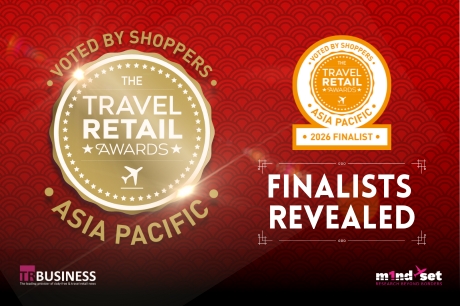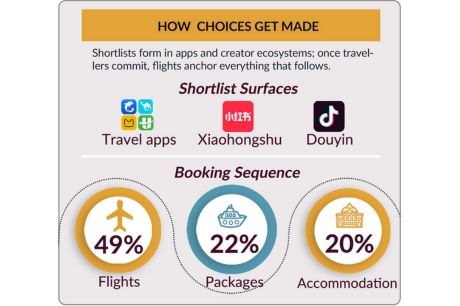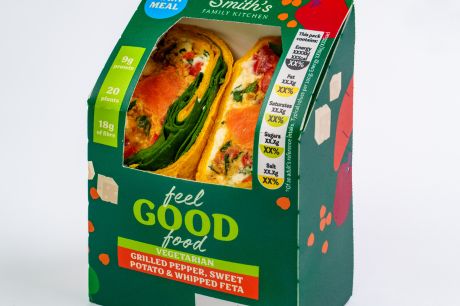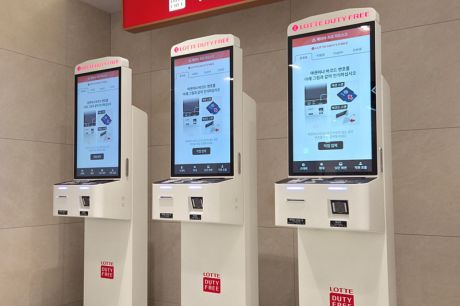TRSW Panel: DF&TR actors ‘on the right track’ to a sustainable future
By Benedict Evans |
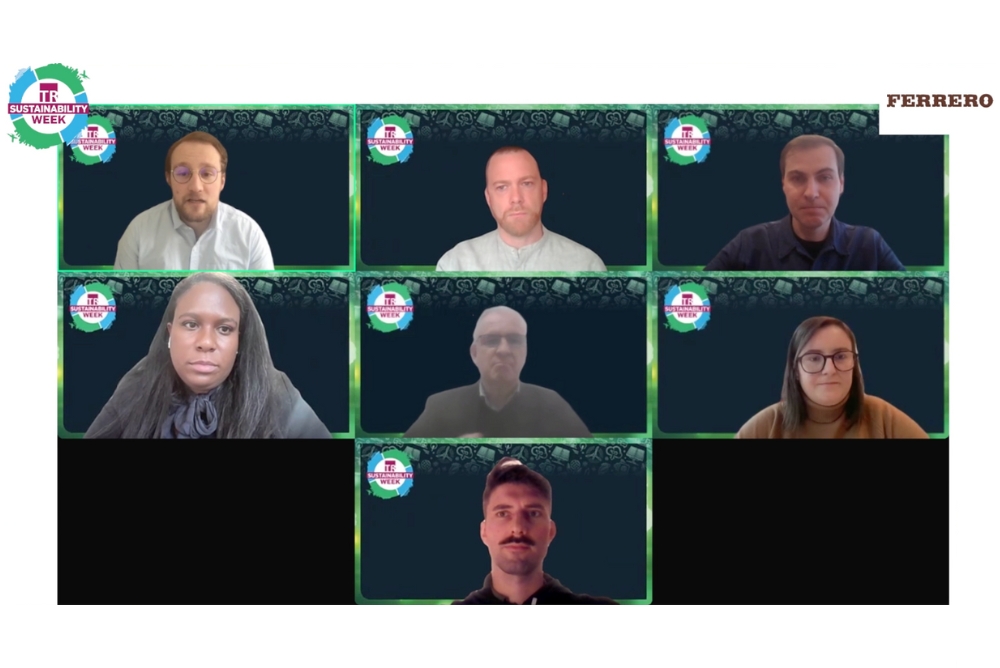
In the last live panel of TRSW 2024, viewers heard from a variety of experts on innovative and effective methods they’re employing to address systemic issues within the DF&TR industry.
The final live panel session for TR Sustainability Week 2024, ‘Nature is the new carbon – Why biodiversity and water matter more than we think’, saw our panel of speakers taking a deep dive into why safeguarding natural habitats is as important as carbon reduction, and whether travel retail stakeholders are taking this seriously enough.
Following a quick introduction to the topic by co-moderator Ashley Green, Sustainability Consultant & Expert at Quantis, viewers were first afforded an inside look at the extensive work undertaken at Champagne Belmont to build its credentials as a producer of organic champagne via its Telmont brand, and the important steps by which the small champagne house continues to innovate.
In the name of nature

Meade added retailers such as Lagardere had afforded them a significant share of space, despite their relatively small standing, with high-profile activations in paces like Charles de Gaulle, a clear sign of the willingness of travel retailers to promote organic products within the channel.
Resilience and regeneration
Garnier sated: “ChobaChoba is the first farmer-owned chocolate company in Switzerland, as such we see nature as a co-creator in our value chain. We place significant emphasis on championing organic processes to boost soil health, carbon storage etc. and it’s worth measuring the effect of these practices, which all build resilience against climate impact, and drive greater productivity over the long term.
I would like to start by saying carbon is undeniably an important indicator of monitoring impact, particularly within cacao farming. In deforested areas, there is 6kg of CO2 per kg of chocolate produced. Within conventional farming practices this drops to 2kg of CO2 per kg of cacao. With organic farming this goes down to 1/2kg, and if you advance to regenerative agriculture drops below 1/2kg of CO2 per kg of chocolate.
It’s clear however that carbon monitoring alone doesn’t capture the full picture of sustainability, as focusing solely on carbon risks oversimplifying the complexity of interactions between soil, water, biodiversity, and climate. It’s like trying to understand a rainforest by looking at a single tree.”

Garnier then delved into carbon offsetting, which he said addresses the symptoms but not root causes of ecological damage, noting the focus must shift from one-dimensional reactive solutions to proactive and integrated approaches which address systemic issues.
“We adopt an approach which accounts for soil health, organic matter, soil structure, and fosters beneficial microorganisms, water conservation, water quality,” said Garnier, noting that on ChobaChoba’s farms it has implemented practices such as the planting of different varietals of native species, as well as diversifying its crop rotation, income stream, and encouraging a more holistically productive value chain.
Garnier commented: “We often discuss nature and biodiversity as separate from humanity. What regenerative agriculture does is challenge this notion, invites us to embrace the reality of us as an integral part of the systems we live in. Crop and income diversification is one major example for farmers.
This creates new revenue streams and reduces vulnerability to market fluctuations, climate shocks. We’re turning agricultural systems into an ally for nature. It’s a learning process and we need to innovate. To be honest it’s not always easy. It requires investment, collaboration, and a commitment to long term change.”
Risk mitigation at the source
Next was Ylena Maitino, Group Public Policy Sustainability Manager, Ferrero, who gave an in-depth look at the group’s green procedures and initiatives, and described how Ferrero’s work on traceability, which began many years ago, has evolved over time to include a greater array of environmental and social aspects.
“As part of our responsible sourcing approach, we invest in relations with suppliers, and in mitigation programmes which help us address some of these systemic supply chain issues, and help us support standards at a local level,” said Maitino, who continued: “Within our supply chain we’ve been partnering with sustainable agriculture networks on best practice and techniques and working with farmers on the ground to leverage knowledge on how to best improve yields.”
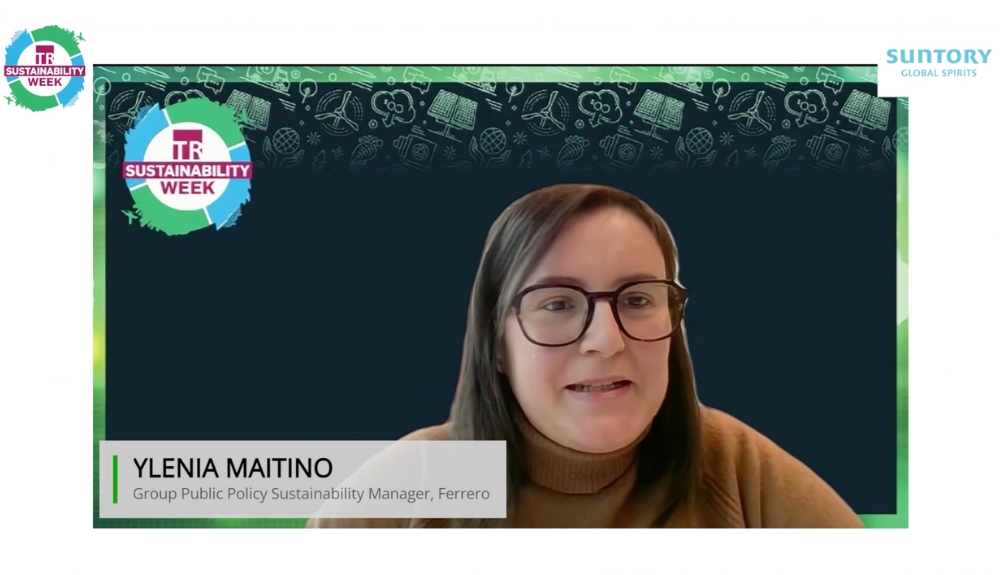
Maitino also detailed the four key pillars of Ferrero’s sustainability approach, which include protection of the environment, responsible ingredient sourcing, the promotion of responsible consumption, and the empowerment of the consumer to make actively sustainable choices.
“Knowing where your ingredients come from is key if you really want to understand your supply chain, where the risks could be and how to address or mitigate those risks….Our responsible sourcing approach is built around four steps. First is having a solid due diligence process and supplier management processes. The second level is traceability. Thirdly we rely on certification and finally, the fourth step of our approach is linked to mitigation risk for which we invest in mitigation programmes.
For every key ingredient we have also developed commodity charters and these are public commitments which set all requirements which our suppliers must meet for sourcing cocoa, hazelnut, palm oil and all raw products.”
Maitino continued: “Within the context of the EUDR, we welcomed these proposals because we believe it could provide all actors in the value chain with certainty and guidance on how to embark on a sustainability journey.”
Updates to EU legislation
Arnaud Rolland, Vice President, CSR Lagardère Travel Retail, was then called upon to weigh in on the latest EUDR legislation, and its potential impact on the DF&TR industry.
Rolland said: “The new regulation will be very demanding all along the chain and we have a shared responsibility to ensure compliance, which is a big issue given the number of products we are selling every day. We Need to find best way to share data and indeed compile data.
Consumers want more information, transparency, they don’t believe every marketing claim around sustainability credentials. We need to give the right info and also proof points, so the examples of ChobaChoba and Telmont are very promising as they are very serious in their approach.”

Rolland offered valuable data insights from Lagardere on its own ecological impact, noting there is much more work to be done within the industry to become a ‘best in class’ retail market for sustainable practices and products.
“As retailer we do a full carbon footprint analysis, and when we compare it to our science-based target initiatives we are right in the middle of it.
49% of products we sell are flagged products, half of our carbon emissions are directly related to agricultural impact of product. It’s good to talk about deforestation and regenerative agriculture and sustainable/ organic practices, but it’s not enough. We need to put figures behind efforts being made in all value chains.”
Rolland also noted noted the new SBTI guidelines are to make a distinction between products whose impact is agricultural from the others, meaning suppliers and retailers will have an even greater task ahead in terms of certification, though he welcomed the opportunity to do so.
Fostering collaboration
The final presentation of the panel was delivered by Stéphane Ogé, Head of Quality & CSR Performance at Lacoste, who talked at length about the immense impact of the textile industry on water sources and the ‘earth systems’ which offer stability and resilience for natural habitats and rural environments.
“One-third of raw materials in the fashion industry are made to become waste – as in to make two polo shirts requires leftover fabric amounting to that off one polo shirt. For all this waste the recycling industry for textiles is not particularly mature, and this causes soil and water pollution,” said Ogé, who offered insightful and stark data to highlight the danger of this issue, if left unchecked.
“To make one polo you need four years of (2300l) personal drinking water, this is due to cotton growing and dyeing, which affects water cycles in some regions and fosters eutrophication,” he said, offering an example of how Lacoste is looking to mitigate this issue.
“We now work closely with farmers, and have decided to create partnerships with cotton growers. We have win-win partnerships where they have visibility on volume and cost, and we have visibility on our environmental impact, and importantly, the data to make lifecycle assessments, and see to what extent our practices are working in terms of renewable energies, pest management, soil regeneration etc.”

Ogé also covered ground where concerning Lacoste’s overarching sustainability practices across carbon, zero textile waste, water consumption and chemical usage.
Ogé added: “On carbon, we’re asking all our supplier’s not to use coal (-37% CO2), monitoring carbon reduction roadmap of all suppliers, with the aim of a 37% reduction in CO2 output. On waste we have a zero destruction of textile waste goal as our major commitment.
On water, we have a very similar approach as for carbon, asking our factories to reduce water consumption, and the last point is on water quality which is, we are aiming for ZDHC (zero discharge hazardous chemicals).”
During the Q&A session held in the latter half of the webinar, the panel engaged in a discourse surrounding several topics posted by the audience, covering ground on: the EUDR legislation; the potential advancement of pre-loved luxury as a means of tempering the fashion industry’s ecological footprint; the necessity or utility of accreditation; the ever-present threat of greenwashing; and the future growth of organic champagne within the DF&TR industry.
Use the link above to view the full session on-demand.
For the full event agenda, click here.
View our sustainability content: Stay close to the dedicated section on our website to view TR Sustainability Week content, including this edition’s Sustainability Pitch broadcasts.
To read the dedicated event programme, click here.
For more on the Sustainability Pitch programme, click the below links
READ MORE: Pitches set: Suntory Global Spirits, Ferrero, Kellanova, Rémy Cointreau
READ MORE: Pitch series returns with high-profile Guardians
To find out more about TR Sustainability Week 2024 please visit www.TRBusiness.com, www.travelretailsustainabilityweek.com or access the below
READ MORE: TR Sustainability Week now live – click to view
READ MORE: TRSW24 panel: Partnership and communication key to ESG
READ MORE: TRSW24 keynote – “Sustainability is par for the course – not an add-on”
Antony Morato partners with 2.0 & Partners to expand TR footprint
Image Credit: Antony Morato Antony Morato has entered into a new collaboration with...
REVEALED: Travel Retail Awards APAC Finalists
Image Credit: TRBusiness TRBusiness and m1nd-set are thrilled to announce the finalists in the...
Estée Lauder launches Joy Unwrapped holiday campaign across APAC
Image Credit: Estée Lauder Travel Retail Asia Pacific Estée Lauder Travel Retail has...
-
 Travel Retail Sustainability Week,
Travel Retail Sustainability Week,Antony Morato partners with 2.0 & Partners to expand TR footprint
-
 Travel Retail Sustainability Week,
Travel Retail Sustainability Week,REVEALED: Travel Retail Awards APAC Finalists
-
 Travel Retail Sustainability Week,
Travel Retail Sustainability Week,Estée Lauder launches Joy Unwrapped holiday campaign across APAC

In the Magazine
TRBusiness Magazine is free to access. Read the latest issue now.

 Trbusiness. The travel retail Trbusiness. The magazine for global retail and duty free professionals.
Trbusiness. The travel retail Trbusiness. The magazine for global retail and duty free professionals.

